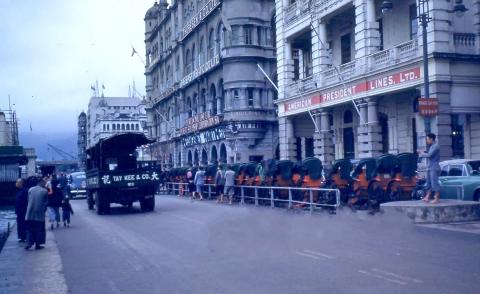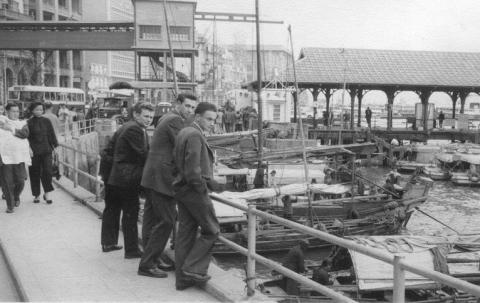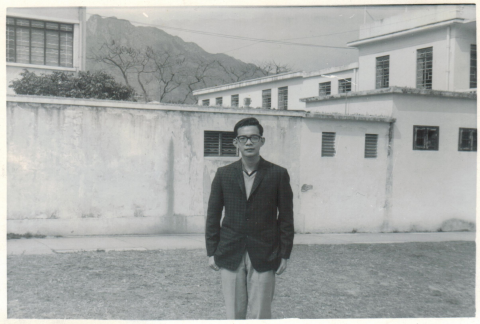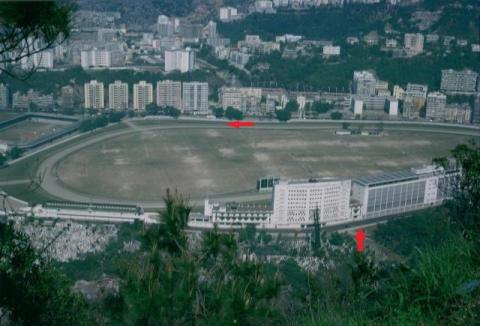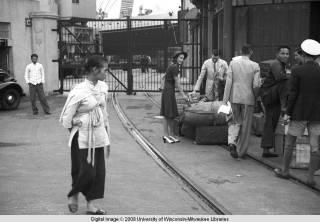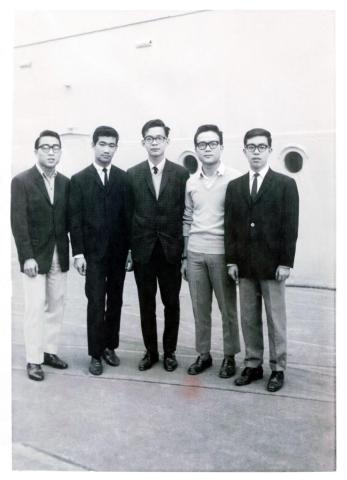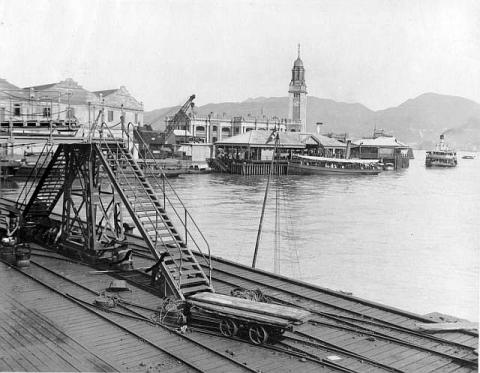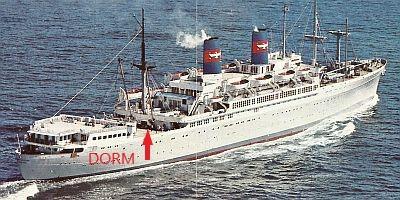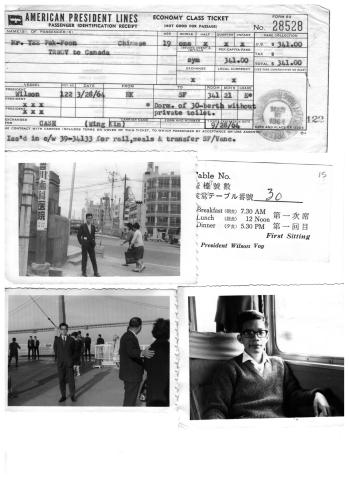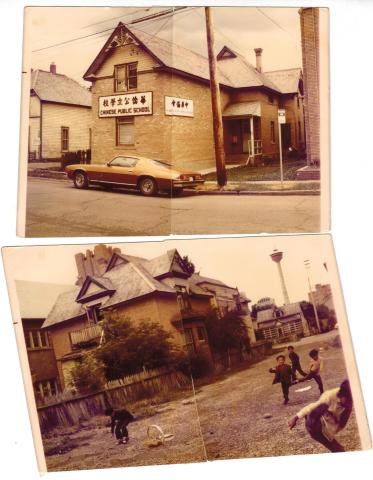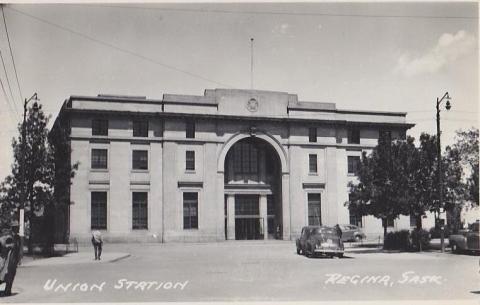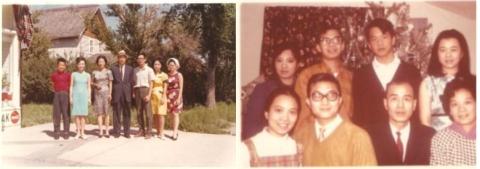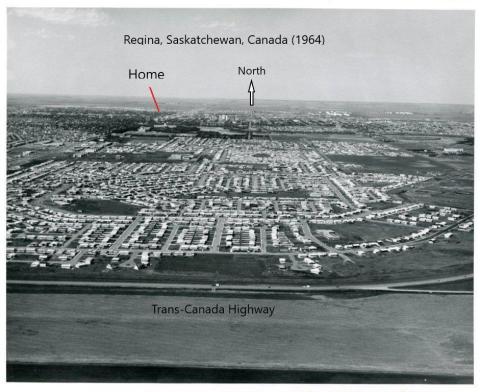10.1 Process and Plan for the Future
In late 1963, the applications of my two sisters and me to emigrate to Canada were near completion. Grandpa Chan received words from parents that I learn a trade to become independent someday. Regina, Saskatchewan had no Chinese BBQ shops and minimal Chinese grocery stores. They thought it would be a good for me to become a BBQ cook. Instead of learning from an expert in Hong Kong, I bought a book. I spent more time looking at pictures of the poor duck before and after roasting than reading the instructions. I roasted several ducks, but I don't think the results would have passed the test.
At the Canadian Consulate in Hong Kong during my interview, an officer asked me questions while his young Hong Kong assistant typed my answers with terrific speed. At the conclusion of the interview, the man placed a bunch of papers into a large envelop, sealed it with glue, and signed his signature over all the joints of the envelop.
10.2 Last Walk in Hong Kong
The date of my travel was decided when Grandpa Chan took me to the office of the American President Lines Ltd in Central, Hong Kong. Flying was expensive so grandpa decided that we travel by ship like our parents did nine years earlier. The company occupied the entire ground level of the St. George's Building. The left (east) half was their office, and the right side had two ticket counters.
My sisters would share a cabin with a Hong Kong couple, and I in a dorm with 29 other male passengers. My ticket to San Francisco cost $341 USD, it included 3 meals a day, a bed in a dorm and train fare and meals to Vancouver, Canada.
Three weeks before departure, I went to my St. Francis Xavier's principal's office and informed Brother Vincent that I would soon be leaving school for Canada. He was delighted to hear the news, pulled out a big book from the book case, and read about Canada - big country, English and French speaking people, very nice place, and wished me a pleasant journey. I would miss our Form 5 final exams, a relief, but also a price for me to pay. I completed high school in Canada.
Two weeks before departure day, my street friend Ah-Ming and I walked to Kowloon Tong. He took a photo of me standing on Lincoln Road my usual starting point for hiking to Lion Rock.
I gave my birds to the bird vendor on Shek Kip Mei Street - a singing green finch, Japanese White-Eye, the talking Mynah, and their cages. He had been very friendly with me.
I took a ferry to Hong Kong island, first grandpa's office on Connaught Road West, then a tram ride to the peak, and Happy Valley Racecource. It was a week day and there were no horse races. At the entrance, I asked a worker if I could go inside to look around. To my surprise, he let me in. The whole place was quiet except for a few men working. I walked in the middle of the track full circle, thanks to that man's accommodation.
10.3 Departure Day (March 28, 1964)
The day started early for me and my sisters. After loading our luggage into a taxi, I walked up to my home one last time. There, grandpa was standing at the door but not grandma. She could not bear the sight of me leaving. I went to her bedroom to say good-bye - "Grandma, thank you very much for raising me. I am now going to Canada". She did not reply except bobbing her head a few times. I went back to the door and as I walked past grandpa, he said "小心, 一帆風順" (Be careful, have a smooth sailing.) I waved good-bye and by this time tears were streaming down my face. In Taishanese, I cried out "我會寫信給你, 如果沒有,你就罵我" / (I will write to you, if I don't, you scold me). All these years, we spoke to each other so far in between, and so brief each time.
Grandpa and grandma cared for me after my parents left Hong Kong. They never raised their voice, showed anger or frustration. They have fulfilled their promise to my mother. Our nine years together are a part of my most cherished memories.
Grandpa passed away in 1966. Eight years later, grandma moved to Canada to live with my parents in Regina, Saskatchewan. She passed away in 1978.
The taxi dropped us off at the entrance to Kowloon Wharf. The scene around me was similar to this photo taken by the famous photographer in 1940 - the railway tracks, Customs Office building, and the large gates which were already opened when we arrived.
We walked to the Number 1 Pier where our ship President Wilson was docked. A worker took over our luggage. To enter the ship, we walked up some steps and next a gangplank. After showing my ticket to a ship crew, I looked for my sleeping bed.
The dormitory was one large open place at the rear of the ship. About 30 passengers, all male, would sleep here on 2-level bunk beds for the journey. I was one of the very few teens, the others young to middle age men travelling to USA the first time or returning after their home visit. My sisters shared a private cabin with a young Hong Kong couple. For the rest of the day, families and friends toured the ship making the deck like a crowded street in Hong Kong.
From left: George, Henry, Peter, Michael, Dominic.
While this photo was taken decades earlier, its view is very similar to that from my ship.
By about 6 p.m., most of the visitors had left, and there were public announcements that it's time for visitors to leave before the ship sails. Next, the crew let off streamers. I saw a girl about my age standing on the pier holding a streamer and the other end tied to the railing. I untied it and showed her that I had it. She was standing on the same spot on this side of the 4-wheel trolley. We held the streamer with care for fear of breaking it, and periodically, we looked at each other. She was the last person I held onto before leaving Hong Kong.
While sailing out of Kowloon Wharf, I saw the city lights at Central and Causeway Bay. I was still in Hong Kong but this time it was different. No street and car noises except the noise from the ship's engine!
After the ship sailed past North Point, the city lights began to thin out, and the ridge line became barely visible. It was a moment of self-reflection. Many things crossed my mind. I am leaving the place where I grew up, my friends, classmates and neighbours, and more sadly my grandparents. I know where I am going, but have no idea how the rest of my life would turn out. My education is so so, secondary school yet to complete, and no marketable skills. I returned to the dorm with a heavy heart but also a sense of hope and excitement.
10.4 Ship and Trains
The staff with their wheel-carts served 3 meals a day six passengers per table. The portions were sufficient and of good quality, but the western style needed several days to get used to. There was a bar, but it didn't do me any good. They showed several movies during the voyage, and I watched "Seventy-Six Trombones". The coin-free automatic washing machine fascinated me. One time, I ventured to the mid-section of the ship where I felt like walking on land.
Our ship made half-day stops at Kobe, Yokohama and Honolulu during which time passengers toured the shore. In Honolulu, I had a $1.5 US haircut. After landing in San Francisco, we collected our luggage and walked to the train station. After several hours of wait, our train departed for Canada. We spent three days at a relative's home in Vancouver.
The train ride from Vancouver to Calgary offered beautiful scenery with majestic mountains and clear rushing water, and large evergreen trees some with snow on them. When we reached Calgary, father was waiting at the train station. He was teaching at a Chinese school in Calgary. Since classes were not in session, we spent two nights in the school building. On the upper level rear walkout, there was the last remaining snow from winter.
This photo was taken in 1975 when I returned for a visit. The building was estimated to have been built sometime in the 1940s, and its size is an indication of the city's Chinese-Canadian population at that time. Today, a much larger and taller school building stands on the same site. The church next door is still there.
On the third day, the four of us - father, my two sisters and I - travelled in father's car to Regina, Saskatchewan to join with the rest of our family. He had just resigned from his teaching job.
The Trans-Canada Highway between Calgary and Regina gave us a different scenery - few rolling hills and no high mountains. The land was flat with wheat field after wheat field, and the occasional small towns our car was passing through. Some road information needed two successive signs spaced a distance apart to give drivers sufficient time to read.
Final destination for many early settlers in Saskatchewan.
Source: Vintage Regina
L: First family photos in Canada. R: Christmas with friend visiting from USA.
Source: Vintage Regina
